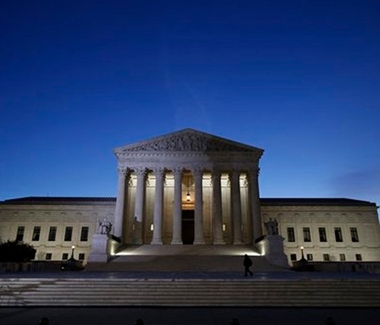Supreme Court scuffle triggers constitutional clash

Washington (AP) — It only took one man's death to give Congress an opening to extend its dysfunction to the rest of government.
Republican opposition to letting President Barack Obama replace the late Justice Antonin Scalia quickly sparked a constitutional clash over the president's right to fill Supreme Court vacancies. Democrats, who have their own history of boxing out Republicans over court nominees, are up in arms, but begrudgingly concede that Obama's pick is unlikely to be confirmed.
So as both parties prepare for political brawling, the eight remaining justices could spend the next year hearing critical cases alongside an empty seat, unable to break a tie in the event of a 4-4 split.
The standoff raises a scenario that Washington long has dreaded: that bitter partisanship in Congress, mixed with the tactics of obstruction such as the filibuster, would eventually jeopardize another branch's basic ability to function.
"If Republicans do what they suggest, I think we're headed not only for a constitutional crisis but also for big problems for the legislative process," said Jim Manley, a former aide to Senate Democratic leader Harry Reid of Nevada. "This is the natural reaction to the continued Senate breakdown we've seen for years."
Supreme Court nominees have been rejected before. Yet Democrats accuse Republicans of taking obstructionism to a new level by insisting Obama not even name a nominee with 11 months left in his term — and refusing to hold a confirmation vote if he does. Though the Constitution is clear that it is the president who nominates, Republicans say the Founding Fathers never required the Senate to give a vote.
With a vast majority of Americans already disillusioned by Congress, the White House hopes the GOP gambit will backfire.
"It's a little bit like saying, God forbid something happen to the president and the vice president, 'We're not going to fill the presidency for another year and a half,'" Vice President Joe Biden said this past week.
Republicans are unimpressed by those appeals to the Constitution. After all, many of the leading cases now before the Supreme Court question Obama's unilateral actions. Opponents argue Obama exceeded his legal authority with climate change and immigration policies that he tried, but failed, to persuade Congress to enact.
"There is a significant portion of the country that watches the pretty egregious constitutional liberties the president has taken over the years and views with a sense of humor his newfound respect for the document," said Josh Holmes, former chief of staff to Senate Majority Leader Mitch McConnell, R-Ky.
The prospect of a protracted Supreme Court vacancy sounded alarms for those who worry that congressional gridlock will ultimately grind government to a halt. Three years ago, a quarrel over Obama's health care law led to a partial 16-day government shutdown. Obama has faced repeated nail-biting moments in which it appeared Congress might allow the U.S. to default on its debt or refuse to fund the government.
Obama acknowledges that he and his party aren't blameless. The White House says Obama regrets that when he was a senator, he joined a filibuster against Samuel Alito's nomination to the high court. Alito was confirmed anyway.
Less than three years ago, when Democrats ran the Senate, they changed practices so that the minority party couldn't use a filibuster to block presidential nominees for key appellate judgeships. The change, which did not apply to Supreme Court picks, was accomplished without a single GOP vote. Infuriated Republicans warned that Democrats would lose Senate control sometime and regret that they had trampled on the minority's rights.
Obama and his aides have said he will nominate a qualified candidate who can win GOP support. But to defeat a threatened filibuster, Obama would have to peel away 14 Republicans, and that feat looks impossible now.
Former Sen. Bob Kerrey, D-Neb., said that in past confirmation tussles, power was concentrated in the Senate Judiciary Committee, where the Republican and Democrat leaders worked closely together. Since then, power has shifted to Senate leaders, he said, making the process more ideological and conflicts harder to resolve.
"For the next president, it will be, 'Well, is it 11 months? Fifteen months? Eighteen months?' If someone announces they're going to leave the Senate, do they lose the right to vote?" Kerrey said. "You can argue, 'Well, let's let the people decide.'"
But Sara Fagen, President George W. Bush's former political director, said Senate Republicans would pay no political penalty.
"The Republican base doesn't want a liberal justice, and they're completely fine with the court having a vacancy for as long as is required to get a justice they believe is right," Fagen said.
By Josh Lederman, Associated Press. Copyright 2016 The Associated Press. All rights reserved. This material may not be published, broadcast, rewritten or redistributed.
The Gayly – February 21, 2016 @ 10:50 a.m.





